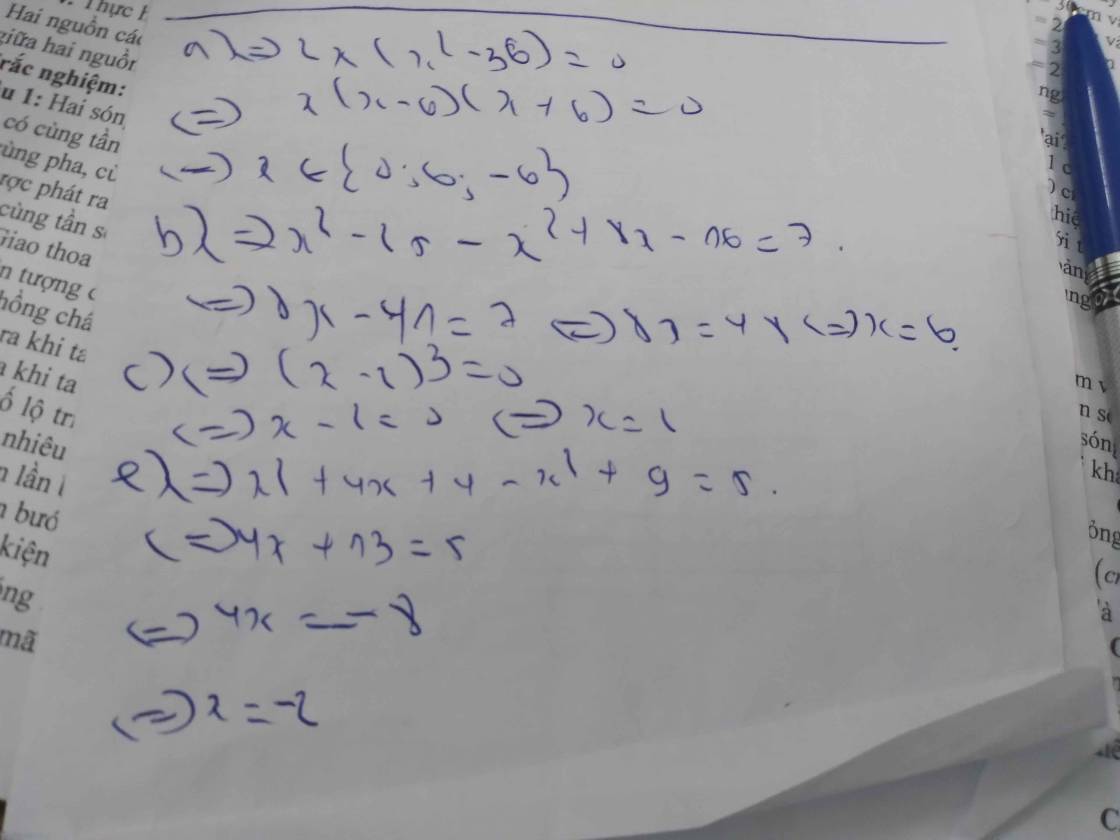
Hãy nhập câu hỏi của bạn vào đây, nếu là tài khoản VIP, bạn sẽ được ưu tiên trả lời.


a: ta có: \(\left(8x+2\right)\left(1-3x\right)+\left(6x-1\right)\left(4x-10\right)=-50\)
\(\Leftrightarrow8x-24x^2+2-6x+24x^2-60x-4x+40=-50\)
\(\Leftrightarrow-62x=-92\)
hay \(x=\dfrac{46}{31}\)
b: ta có: \(\left(1-4x\right)\left(x-1\right)+4\left(3x+2\right)\left(x+3\right)=38\)
\(\Leftrightarrow x-1-4x^2+4x+4\left(3x^2+9x+2x+6\right)=38\)
\(\Leftrightarrow-4x^2+5x-1+12x^2+44x+24-38=0\)
\(\Leftrightarrow8x^2+49x-15=0\)
\(\text{Δ}=49^2-4\cdot8\cdot\left(-15\right)=2881\)
Vì Δ>0 nên phương trình có hai nghiệm phân biệt là:
\(\left\{{}\begin{matrix}x_1=\dfrac{-49-\sqrt{2881}}{16}\\x_2=\dfrac{-49+\sqrt{2881}}{16}\end{matrix}\right.\)

mk nghĩ đề đúng của câu a phải là \(8x^2\left(2x-3\right)-4x\left(4x^2-6x+1\right)+4\left(x-3\right)\)
nhân tung ra rồi rút gọn lại là xong kết quả của phép tính là \(-12\)không chứa ẩn x nên bt trên ko phụ thuộc vào biến
bài b tương tự
\(\frac{1}{2}x\left(10x^3-8x^2+4x-2\right)-5x\left(x^3-\frac{4}{5}x^2+\frac{2}{5}x-\frac{1}{5}\right)+7\)
\(=5x^4-4x^3+2x^2-x-5x^4+4x^3-2x^2+x+7\)
\(=7\)
Vậy bt trên ko phụ thuộc vào biến.
Làm hơi tắt tí thông cảm nha!

một đòn bẫy dài một mét .đặt ở đâu để có thể dùng 3600n có thể nâng tảng đá nặng 120kg?

d) \(2x^2+5x-7=0\)
\(\Leftrightarrow\left[{}\begin{matrix}x=1\\x=-\dfrac{7}{2}\end{matrix}\right.\) \(\left(a+b+c=1\right)\)

a: Ta có: \(x^2-8x+20\)
\(=x^2-8x+16+4\)
\(=\left(x-4\right)^2+4>0\forall x\)
b: Ta có: \(-x^2+6x-19\)
\(=-\left(x^2-6x+19\right)\)
\(=-\left(x^2-6x+9+10\right)\)
\(=-\left(x-3\right)^2-10< 0\forall x\)

Bài 1 :
a, \(\left(x-3\right)^2-4=0\Leftrightarrow\left(x-3\right)^2=4\Leftrightarrow\left(x-3\right)^2=\left(\pm2\right)^2\)
TH1 : \(x-3=2\Leftrightarrow x=5\)
TH2 : \(x-3=-2\Leftrightarrow x=1\)
b, \(x^2-2x=24\Leftrightarrow x^2-2x-24=0\)
\(\Leftrightarrow\left(x-6\right)\left(x+4\right)=0\)
TH1 : \(x-6=0\Leftrightarrow x=6\)
TH2 : \(x+4=0\Leftrightarrow x=-4\)
c, \(\left(2x-1\right)^2+\left(x+3\right)^2-5\left(x+2\right)\left(x-2\right)=0\)
\(\Leftrightarrow4x^2-4x+1+x^2+6x+9-5\left(x^2-4\right)=0\)
\(\Leftrightarrow2x+30=0\Leftrightarrow x=-15\)
d, tương tự

b) \(\frac{3\left(2x+1\right)}{4}-\frac{5x+3}{6}+\frac{x+1}{3}=\frac{x+7}{12}\)
<=> \(\frac{13\left(x+1\right)}{12}-\frac{5x+3}{6}=\frac{x+7}{12}\)
<=> 13(x + 1) - 2(5x + 3) = x + 7
<=> 13x + 13 - 10x - 6 = x + 7
<=> 3x + 7 = x + 7
<=> 3x + 7 - x = 7
<=> 2x + 7 = 7
<=> 2x = 7 - 7
<=> 2x = 0
<=> x = 0
c) 2x + 4(x - 2) = 5
<=> 2x + 4x - 8 = 5
<=> 6x - 8 = 5
<=> 6x = 5 + 8
<=> 6x = 13
<=> x = 13/6

(x+2)(4x^2 -2x+1)+(3-2x)(9+6x+4x^2) = -4x^3+6x^2-3x+29
nha bạn chúc bạn học tốt nha

\(\dfrac{4x+3}{5}-\dfrac{6x-2}{7}-\dfrac{5x+4}{3}>3\)
=>4/5x+3/5-6/7x+2/7-5/3x-4/3>3
=>-181/105x>362/105
=>x<-2